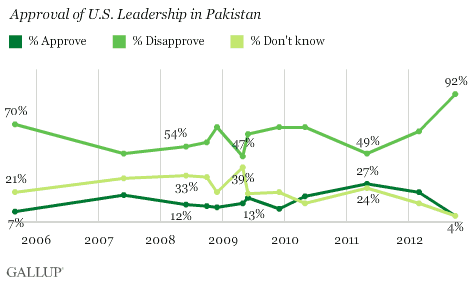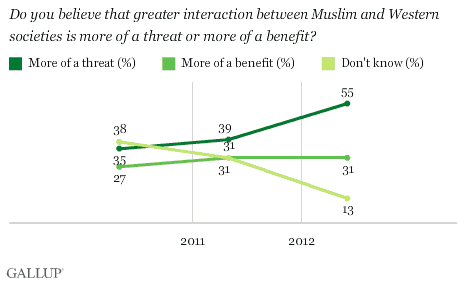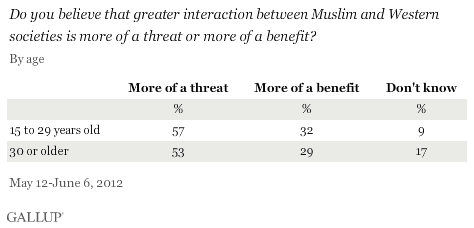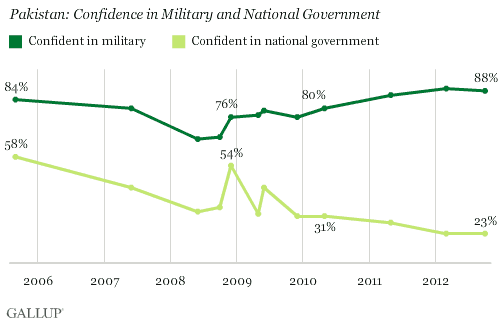WASHINGTON, D.C. -- With President Barack Obama's first term characterized by strained relations between Pakistan and the U.S., more than nine in 10 Pakistanis (92%) disapprove of U.S. leadership and 4% approve, the lowest approval rating Pakistanis have ever given.

Pakistanis' approval of the leadership of their ostensible ally, the United States, has historically been quite low. However, perceptions began to change, albeit modestly, through much of Obama's first term. As recently as May 2011, 27% of Pakistanis approved of U.S. leadership, the apex of support. Noticeably, approval declined after the May 2011 killing of Osama bin Laden, carried out by the U.S. military without the assistance of the Pakistani military -- an event that many Pakistanis viewed as a blatant disregard for Pakistani sovereignty.
These findings are based on a survey conducted from Sept. 30-Oct. 16, 2012, in Pakistan. The survey directly followed massive demonstrations against the release of an anti-Muslim film made in the U.S.
Concurrently, Pakistanis now more than at any other time in the past three years feel threatened by interaction with the West, according to a May 12-June 6, 2012, survey. A majority (55%) say interaction between Muslim and Western societies is "more of a threat," up significantly from 39% in 2011. This sharp increase is observed at a time of heightened Pakistani concerns regarding U.S. encroachment on Pakistani sovereignty, including an intensified number of U.S. drone strikes in Pakistan, as well as the aforementioned May 2011 killing of bin Laden by the United States military. Thirty-one percent instead see interaction between Muslim and Western societies as "more of a benefit," and the other 13% are unsure.

Similar majorities of younger and older Pakistanis -- 57% of Pakistanis aged 15 to 29 and 53% of those 30 or older -- deem interaction with the West as a threat. However, younger Pakistanis are slightly more likely to have an opinion on this matter: Fewer than one in 10 (9%) answered "don't know," whereas almost a fifth (17%) of older Pakistanis were unsure. Nearly half of the Pakistani population (49%) is between the ages of 15 and 29. The largely anti-Western sentiment among these young Pakistanis suggests that, even as this sizable group ages and begins to have a larger role in Pakistani governance, relations between the U.S. and Pakistan may continue to be fraught with challenges.

Ahead of Elections, Faith in Civilian Government Collapses
Relatedly, the public's confidence in the Pakistani national government -- sometimes seen by Pakistanis as too cozy to the U.S. government -- has nosedived, reaching a low of 23% in March and October 2012. This is down from 54% in December 2008, shortly after the beginning of democratically elected President Asif Ali Zardari's administration.
Conversely, confidence in the interventionist military -- the organization that has ruled the nation for over half of its post-independence history -- climbed to 88% in October 2012. While support for the military in Pakistan has traditionally been very high, it has regularly met or eclipsed 80% since 2010.

The upcoming May elections in Pakistan will be of seismic importance for the future direction of the country and for U.S.-Pakistani relations. The elections will mark the first time in the country's history that a civilian government peacefully transfers power to a new civilian government. Insomuch as the role of the U.S. in Pakistan weighs on the campaign dialogue, the perceived failures of the current regime might translate into the election of political actors that are more hostile or confrontational toward U.S. interests.
Implications
Due to such events as the elimination of bin Laden by the U.S. military and the reported authorization of 350 U.S. drone strikes in Pakistan, relations between the Obama administration and Pakistan have been steadily deteriorating. By virtue of John Brennan's nomination to head the CIA and a recently leaked Justice Department memo outlining the legal justification for using drones to target suspected terrorists who are also U.S. citizens in foreign countries such as Pakistan, the wisdom and/or effectiveness of this policy is receiving new attention in the U.S. Undoubtedly this question must be viewed through a number of different lenses, including, but not limited to, the overall strategic success of the drone campaign and its impact on necessary actors, such as the Pakistani government, in the United States' continued efforts to identify and eliminate terrorists.
On both accounts, these data may give U.S. policymakers pause. The growing, indeed essentially universal, distaste for U.S. leadership in Pakistan, a nation of such crucial importance -- while perhaps not directly attributable to the increasing number of drones deployed there -- will undoubtedly strain future relations between the two countries.
As this happens, Pakistan itself is at a pivotal moment in its history. The upcoming May elections have the potential to begin a tradition of civilian government and peaceful transitions between democratically elected administrations. Yet this opportunity comes, somewhat ironically, at a time when the public has lost confidence in its civilian government. The degree to which the U.S.-conducted operations within Pakistan have weakened the political position of the existing Pakistani government is an open question, but the concomitant erosion of approval of U.S. and Pakistani leadership on the Pakistani public's part is impossible not to notice. Pakistanis instead put their trust in the military, an important institution with a meddlesome history in national governing affairs. What these trends mean for the coming election is unclear, but they suggest that the next few months could be of vital importance for the stability of the Pakistani government and the U.S.-Pakistani relationship.
For complete data sets or custom research from the more than 150 countries Gallup continually surveys, please contact us.
Survey Methods
Results are based on face-to-face interviews with about 1,000 adults, aged 15 and older. Surveys were conducted in October 2012, June 2012, March 2012, May 2011, May 2010, December 2009, June 2009, May 2009, December 2008, October 2008, June 2008, June 2007, and September 2005 in Pakistan.
For results based on the total sample of national adults, one can say with 95% confidence that the maximum margin of error ranges from ±3.1 to ±4.2 percentage points. Results presented by subgroup would have a higher margin of error. The margin of error reflects the influence of data weighting. In addition to sampling error, question wording and practical difficulties in conducting surveys can introduce error or bias into the findings of public opinion polls.
For more complete methodology and specific survey dates, please review Gallup's Country Data Set details.
